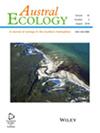Juan Fernández智利大陆架上的网状濑鱼
IF 1.6
4区 环境科学与生态学
Q3 ECOLOGY
引用次数: 0
摘要
Juan Fernández Wrasse, Malapterus reticulatus,以前被认为是Desventuradas和Juan Fernández群岛特有的,首次在智利大陆架上报道。观察结果来自潜水员和鱼叉渔民在社交媒体平台上分享的报告。机器学习模型证实了这些记录,提供了智利中部沿海地区物种存在的证据。因此,这些记录扩大了已知的鱼类范围。本文章由计算机程序翻译,如有差异,请以英文原文为准。

The Juan Fernández Wrasse Malapterus reticulatus in the Continental Shelf of Chile
The Juan Fernández Wrasse, Malapterus reticulatus, previously considered endemic to the Desventuradas and Juan Fernández Islands, is reported for the first time on the continental shelf of Chile. Observations were gathered from reports shared by divers and spearfishers on social media platforms. A machine learning model confirmed these records, providing evidence of the species presence along the coast of central Chile. Therefore, these records expand the known range of the fish.
求助全文
通过发布文献求助,成功后即可免费获取论文全文。
去求助
来源期刊

Austral Ecology
环境科学-生态学
CiteScore
2.90
自引率
6.70%
发文量
117
审稿时长
12-24 weeks
期刊介绍:
Austral Ecology is the premier journal for basic and applied ecology in the Southern Hemisphere. As the official Journal of The Ecological Society of Australia (ESA), Austral Ecology addresses the commonality between ecosystems in Australia and many parts of southern Africa, South America, New Zealand and Oceania. For example many species in the unique biotas of these regions share common Gondwana ancestors. ESA''s aim is to publish innovative research to encourage the sharing of information and experiences that enrich the understanding of the ecology of the Southern Hemisphere.
Austral Ecology involves an editorial board with representatives from Australia, South Africa, New Zealand, Brazil and Argentina. These representatives provide expert opinions, access to qualified reviewers and act as a focus for attracting a wide range of contributions from countries across the region.
Austral Ecology publishes original papers describing experimental, observational or theoretical studies on terrestrial, marine or freshwater systems, which are considered without taxonomic bias. Special thematic issues are published regularly, including symposia on the ecology of estuaries and soft sediment habitats, freshwater systems and coral reef fish.
 求助内容:
求助内容: 应助结果提醒方式:
应助结果提醒方式:


